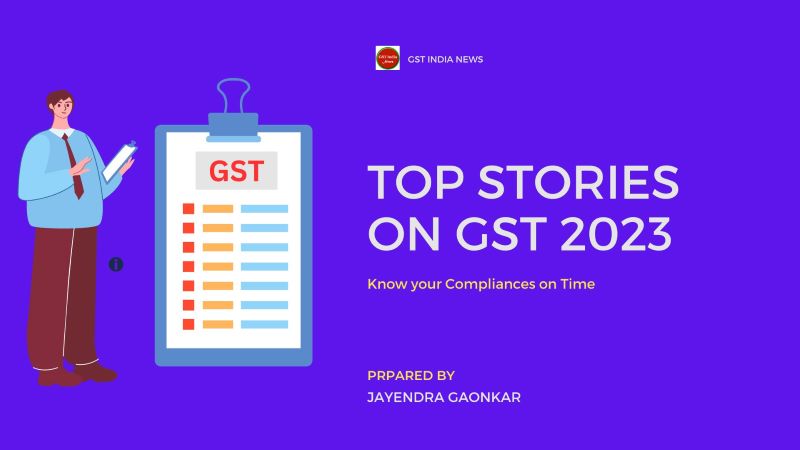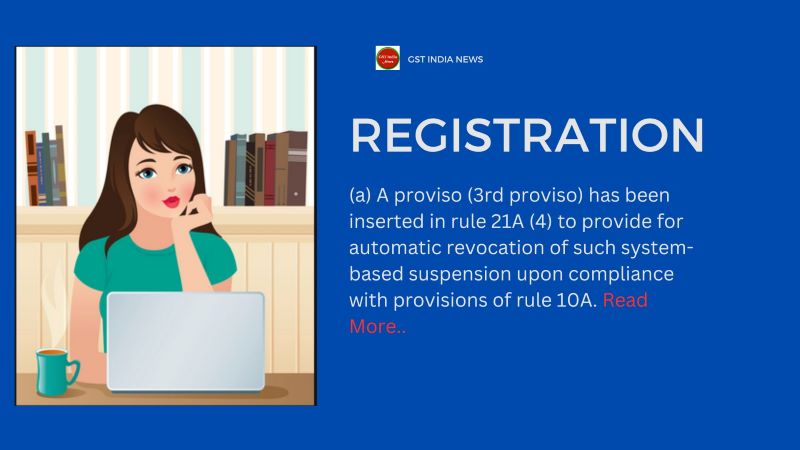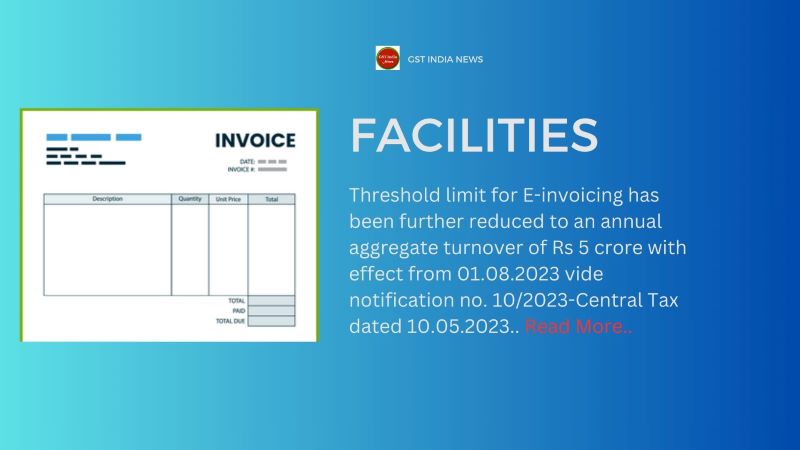Stay updated with the latest GST news to ensure compliance and make informed business decisions. The Goods and Services Tax (GST) is a crucial aspect of modern-day taxation, affecting businesses of all sizes. By staying informed about GST news, you can stay ahead of changes in tax rates, regulations, and compliance requirements.
Keeping up with the latest GST news allows you to understand how it impacts your business operations, pricing strategies, and financial planning. Whether you are a small business owner or a tax professional, being aware of updates in GST can help you navigate through complex tax laws and avoid any penalties or legal issues.

Moreover, staying updated on GST news provides valuable insights into industry trends and government initiatives related to taxation. This knowledge can empower you to make strategic decisions that optimize your tax liabilities and maximize your business growth.
By regularly following GST news sources and publications, you can gain access to expert opinions, case studies, and practical tips from industry leaders. This information equips you with the necessary tools to adapt quickly to changes in the taxation landscape while ensuring compliance with relevant laws.
In conclusion, staying informed about the latest GST news is essential for businesses striving for success in today’s dynamic economic environment. It enables proactive decision-making, ensures compliance with tax regulations, and helps businesses thrive amidst evolving taxation policies. Below are the top GST-related measures to be kept in mind by the Taxpayers in 2023
Refund related measures:
(a) A new functionality has been made available on the common portal which allows unregistered persons to take a temporary registration and apply for a refund. Also, the manner and procedure for filing of refund applications by unregistered persons in certain circumstances has been prescribed vide Circular no. 188/20/2022-GST dated 27.12.2022.
(b) The manner for processing and sanction of such IGST refunds, which were withheld on account of exporters being flagged as risky on the basis of risk parameters and data analytics, was prescribed vide Instruction No.04/2022-GST dated 28.11.2022.
Registration Related Measures:
(a) A proviso (3rd proviso) has been inserted in rule 21A (4) to provide for automatic revocation of such system-based suspension upon compliance with provisions of rule 10A.
(b) An amendment has been made in rule 9 and rule 25 of CGST Rules, 2017 to do away with the requirement of the presence of the applicant for the physical verification of business premises and also to provide for physical verification in high-risk cases even where Aadhaar has been authenticated.

c)Vide Notification No. 03/2023-CT dated 31.03.2023, for such registrations which were canceled for non-filing of returns on or before 31.12.2022 and application for revocation was not filed or appeal has been rejected or appeal is pending within the specified time, the time limit for filing of an application for revocation of cancellation of registration was extended till 30.06.2023. Further, vide Notification No. 23/2023-CT dated 17.07.2023, the time limit for filing of application for revocation of such cancellation of registration, was extended till 31.08.2023.
d)Vide Notification No. 33/2023-CT dated 31.07.2023, “Account Aggregator” has been notified as the systems with which information may be shared by the common portal based on consent provided by the registered person/taxpayer. This will help MSMEs in getting credit/business loans based on their GST registration.
Annual Return related measure:
(a)Vide Notification No. 32/2023-CT dated 31.07.2023 the registered person, whose aggregate turnover in the financial year 2022-23 is up to two crore rupees, has been exempted from filing annual return i.e GSTR 9/9C for the said financial year.
Other facilitation measures:

(a) In order to simplify and decriminalize certain provisions of the GST Act, based on the recommendation of the GST Council, amendments have been made to provisions of the CGST Act, 2017.
(b) Provision for automatic restoration of provisionally attached property after completion of one year: An amendment in sub-rule (2) of Rule 159 of CGST Rules, 2017 and FORM GST DRC-22 has been made to provide that the order for provisional attachment in FORM GST DRC-22 shall not be valid after expiry of one year from the date of the said order. This will facilitate the release of provisionally attached properties after the expiry of the period of one year, without the need for a separate specific written order from the Commissioner.
(c) Vide notification no. 26/2022- Central Tax dated 26.12.2022, Rule 109C and FORM GST APL-01/03W has been inserted in the CGST Rules, 2017 w.e.f. 26.12.2022 to provide for the facility for withdrawal of an application of appeal up to a certain specified stage.
(d) Measure for improving cash flow: Provision has been made to provide for the transfer of balance in the electronic cash ledger of a registered person to the electronic cash ledger of a distinct person. This provision would help a taxpayer easily transfer unutilized balance in the cash ledger between the registered persons having same PAN, without the need for filing a refund claim with tax officers. This would provide ease of doing business and would improve the liquidity and cash flows of such taxpayers.
(e) This threshold limit for E-invoicing has been further reduced to an annual aggregate turnover of Rs 5 crore with effect from 01.08.2023 vide notification no. 10/2023-Central Tax dated 10.05.2023.
(f) Sub-rule (3) of rule 108 and rule 109 of the CGST Rules, 2017 have been amended w.e.f. 26.12.2022 to provide clarity on the requirement of submission of a certified copy of the order appealed against and the issuance of final acknowledgment by the appellate authority.
(g) Vide notification no. 18/2022- Central Tax dated 28.09.2022, w.e.f. 01.10.2022, amendments have been brought in the CGST Act to extend the time period for rectification/amendment of returns/ issuance of credit notes and for availing of input tax credit until the 30th day of November following the end of the financial year to which such details pertain. Earlier it was allowed up to the due date for furnishing of return for the month of September. This provides additional time to the taxpayers for rectification/amendment of returns. Issuance of credit notes and for availment of input tax credit.
(h) Rule 37A has been inserted in CGST Rules, 2017 vide notification no. 26/2022- Central Tax dated 26.12.2022 w.e.f 26.12.2022 to prescribe the mechanism for reversal and re-availing of input tax credit in the case of non-payment of tax by the supplier. The said rule provides that in cases where a return in FORM GSTR3B for a certain tax period has not been furnished by the supplier till the 30th day of September following the end of the financial year and the recipient has availed input tax credit in respect of such invoice or debit note as filed in supplier’s GSTR-1 for that period, the said amount of input tax credit is required to be reversed by the recipient while furnishing a return in FORM GSTR-3B on or before the 30th day of November following the end of such financial year. This facilitates and eases compliance with Section 16 (2) (c) of the CGST Act for the taxpayers.
i) The requisite amendments in the GST Act have been made by Finance Act, 2023 for allowing unregistered suppliers and composition taxpayers to make intra-state supply of goods through E-Commerce Operators (ECOs), subject to certain conditions. These amendments have been notified w.e.f. 01.10.2023 vide Notification No. 34/2023-CT dated 31.07.2023. Lakhs of small taxpayers would benefit from the waiver of the requirement of mandatory registration. This would open a huge e-commerce market for them to sell their goods without getting mandatory registration up to the threshold turnover of registration. Extension of the benefit of making the intra-state supply of goods through an E-commerce Operator (ECO) to the composition taxpayers shows the government’s commitment to supporting small businesses.

